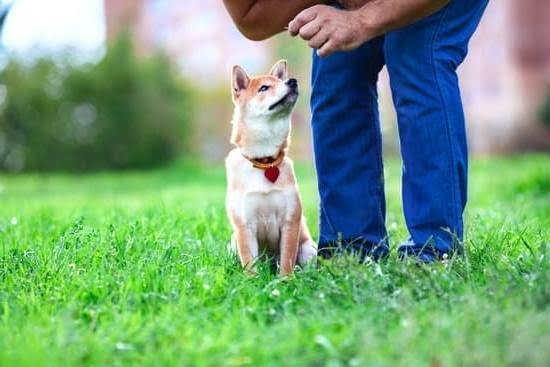Training a 6-month-old dog can be both a rewarding and challenging experience. Understanding the developmental stage of your furry companion is crucial in setting realistic training goals and creating a positive training environment. In this article, we will explore the various aspects of training a 6-month-old dog, from basic obedience to advanced techniques, as well as how to manage common behavioral challenges.
At 6 months old, dogs are still in their adolescence stage, which means they are full of energy and curiosity. It’s important to approach training with patience and understanding, taking into consideration their physical and mental development. Whether you’re working on potty training, leash training, or socialization, knowing how to train a 6-month-old dog requires an understanding of their unique developmental needs.
Setting realistic training goals for a 6-month-old dog involves recognizing their abilities and limitations. This section will cover the importance of patience and consistency in creating a positive learning environment for your furry friend. From managing chewing and biting behaviors to troubleshooting common challenges, we’ll provide valuable insights for effectively training your 6-month-old dog while nurturing a strong bond with them.
Setting Realistic Training Goals for a 6 Month Old Dog
When it comes to training a 6-month-old dog, setting realistic goals is essential for successful training sessions. At this stage of their development, young dogs are still learning and growing, so it’s important to tailor your training expectations accordingly. It’s crucial to understand that just like human babies, puppies require patience and understanding as they navigate the world around them.
One realistic goal for training a 6-month-old dog is to focus on basic obedience commands such as sit, stay, come, and down. These foundational commands are essential for building a strong communication bond between you and your furry companion. By focusing on these simple commands, you can set achievable goals that will help build your dog’s confidence and understanding of what is expected of them.
Another realistic training goal for a 6-month-old dog is to work on their socialization skills. At this stage in their development, young dogs are at a critical age for learning how to properly interact with other dogs and people. Exposing them to different environments, situations, and individuals will help them become well-adjusted and confident adults. Setting goals for positive socialization experiences can help your dog grow into a well-rounded and friendly companion.
Creating a Positive Training Environment for Your 6 Month Old Dog
Training a 6 month old dog can be both rewarding and challenging. One key factor in successful training is creating a positive environment for your furry friend. This means providing the right tools, setting clear expectations, and offering plenty of encouragement.
Start by designating a specific area in your home where you will conduct training sessions. This space should be free from distractions and have enough room for your dog to move around comfortably. Consistency is also crucial in creating a positive training environment. Use the same commands, gestures, and rewards every time to help your dog understand what is expected of them.
In addition to physical surroundings, consider the emotional atmosphere as well. Always approach training with patience and an upbeat attitude. Dogs are very perceptive to human emotions, so maintaining a positive demeanor will make learning more enjoyable for them.
| Positive Training Environment Factors | Description |
|---|---|
| Designated Training Area | Create a specific spot in your home for training sessions. |
| Consistency | Use the same commands, gestures, and rewards for every session. |
| Patient Attitude | Approach training with patience and an upbeat attitude to create a positive emotional atmosphere. |
Basic Obedience Training for a 6 Month Old Dog
Introduction to Basic Obedience Training
Basic obedience training is an essential aspect of your 6-month-old dog’s development. It lays the foundation for further training and helps establish a strong bond between you and your pet. At this stage, your dog is at a crucial developmental phase where they are eager to please and learn, making it an ideal time to start basic obedience training.
Key Basic Obedience Commands
Some key basic obedience commands that you can start teaching your 6-month-old dog include “sit,” “stay,” “come,” “down,” and “leave it.” These commands form the basis of good behavior and will help your dog understand what is expected of them in various situations. Keep training sessions short and frequent, as younger dogs may have shorter attention spans.
Positive Reinforcement
It’s important to use positive reinforcement techniques such as treats, praise, and affection when training your 6-month-old dog. This encourages them to repeat desired behaviors and creates a positive association with obedience training. Avoid using punishment or harsh methods, as these can be detrimental to the trust and relationship between you and your dog.
By focusing on basic obedience training at this stage, you can set the stage for more advanced training in the future while also ensuring that your 6-month-old dog becomes a well-behaved and well-adjusted adult companion.
Potty Training Tips for a 6 Month Old Dog
Potty training a 6 month old dog can be a challenging but rewarding experience. At this age, most dogs are able to control their bladder and bowel movements for longer periods of time, making it an ideal time to focus on potty training. One of the key tips for successful potty training is to establish a routine.
Take your dog out first thing in the morning, after meals, before bedtime, and at regular intervals throughout the day. This will help your dog understand when it’s time to go outside.
Another important aspect of potty training is positive reinforcement. Whenever your 6 month old dog goes to the bathroom outside, praise and reward them with treats or verbal praise. This will create a positive association with going to the bathroom outside and encourage them to continue this behavior.
It’s also crucial to be patient and consistent during the potty training process. Accidents will happen, so it’s important not to scold or punish your dog for this behavior. Instead, clean up accidents without making a fuss and continue with the established routine. Consistency is key in reinforcing the desired behavior and helping your 6 month old dog understand what is expected of them.
| Potty Training Tip | Description |
|---|---|
| Establish a Routine | Take your dog out at regular intervals throughout the day to help them understand when it’s time to go outside. |
| Positive Reinforcement | Praise and reward your dog whenever they go to the bathroom outside to create a positive association with this behavior. |
| Be Patient and Consistent | Avoid scolding or punishing your dog for accidents, and remain consistent in your approach to reinforce desired behaviors. |
Leash Training and Walking Etiquette for a 6 Month Old Dog
Introducing the Leash
At six months old, your dog is at an age where they are ready to learn how to walk on a leash. Start by introducing them to the leash in a positive way. Allow them to sniff and explore the leash before attaching it to their collar. This will help them get used to the feeling of wearing a leash.
Teaching Loose Leash Walking
Once your dog is comfortable with the leash, you can begin teaching them how to walk politely on a loose leash. Start by walking in a quiet, low-distraction area. Whenever your dog pulls on the leash, stop walking and wait for them to come back to your side. Reward them with treats and praise when they are walking nicely beside you.
Walking Etiquette
It’s important to teach your 6 month old dog proper walking etiquette, such as not pulling on the leash, not jumping on people or other dogs, and paying attention to their surroundings. Use positive reinforcement techniques to reward good behavior during walks.
Additionally, it’s crucial to make sure your dog is properly socialized so they can interact politely with other dogs and people while out on walks. Regular walks will also provide mental stimulation for your dog, which is beneficial for their overall well-being.
By following these tips and being patient with your 6 month old dog, you can successfully train them to walk politely on a leash and exhibit good walking etiquette in various environments. Consistent training and positive reinforcement will help establish good habits that will last a lifetime.
Managing Chewing and Biting Behaviors in a 6 Month Old Dog
Chewing and biting behaviors are common in 6-month-old dogs as they are still teething and exploring the world around them. It’s important for pet owners to understand that these behaviors are natural for a young dog, but it’s also crucial to manage and redirect these actions to prevent any negative habits from forming.
One way to manage chewing and biting behaviors in a 6-month-old dog is to provide appropriate chew toys. Make sure these toys are durable and safe for your dog to chew on. When your dog starts to bite or chew on household items or furniture, calmly take the item away and replace it with a designated chew toy. Praise your dog when they chew on the toy, reinforcing the idea that this behavior is more desirable.
Consistency is key when managing chewing and biting behaviors. It’s important to establish clear boundaries and consistently reinforce them. If your dog starts to nip or bite while playing, immediately stop the interaction by standing up and ignoring them for a few seconds.
This teaches your dog that playtime ends when they engage in rough behavior. Additionally, provide plenty of physical and mental stimulation through regular exercise, interactive toys, and obedience training to help curb destructive chewing behaviors. With patience and consistent training, you can effectively manage chewing and biting behaviors in your 6-month-old dog.
Socialization and Behavioral Training for a 6 Month Old Dog
When it comes to socialization and behavioral training for a 6 month old dog, it is important to understand that this stage of development is crucial for shaping your dog’s future behavior and how they interact with the world around them. Here are some key strategies to consider when focusing on socialization and behavioral training:
1. Expose your dog to different environments: Take your 6 month old dog to various places such as parks, busy streets, or even pet-friendly stores. This will help them become familiar with different sights, sounds, and smells, ultimately helping them feel more comfortable in a range of situations.
2. Introduce your dog to new people and animals: Encourage positive interactions with other dogs and people by organizing playdates with well-behaved pets or inviting friends over to meet your dog. This can help reduce fear or anxiety towards unfamiliar individuals.
3. Positive reinforcement techniques: Use treats, toys, or praise to reward good behavior during socialization and training sessions. This helps your 6 month old dog associate positive experiences with new people, animals, and environments.
By focusing on socialization and behavioral training at this stage in your dog’s development, you can help ensure that they grow into a well-adjusted and confident adult dog. Remember to be patient and consistent as you work through this process with your furry friend.
Advanced Training Techniques for a 6 Month Old Dog
Once your 6-month-old dog has mastered basic obedience training, it may be time to move on to more advanced techniques. These training methods will help further develop your dog’s skills and strengthen the bond between you and your furry friend. Here are some advanced training techniques to consider for your 6-month-old dog:
1. **Trick Training:** Teaching your dog fun and impressive tricks can provide mental stimulation and strengthen their ability to learn new commands. Consider teaching tricks such as “roll over,” “play dead,” or “fetch specific items by name.”
2. **Agility Training:** Introducing your dog to agility exercises such as weaving through poles, jumping over hurdles, and navigating tunnels can improve their physical fitness, coordination, and confidence.
3. **Scent Work:** Engage your dog’s powerful sense of smell by introducing scent work activities. This type of training involves teaching your dog to search for specific scents and can be a rewarding mental challenge for them.
It’s important to remember that advanced training techniques should always be introduced gradually and with positive reinforcement. Patience, consistency, and plenty of rewards will help ensure that your 6-month-old dog enjoys the learning process while mastering these more complex skills.
Troubleshooting Common Training Challenges With a 6 Month Old Dog
In conclusion, training a 6-month-old dog can be a rewarding experience with the right approach and consistency. Understanding the developmental stage of your dog is crucial in setting realistic training goals and expectations. By creating a positive training environment, focusing on basic obedience, potty training, leash etiquette, and managing chewing and biting behaviors, you can set your dog up for success.
Socialization and behavioral training are also essential at this stage to ensure that your dog becomes well-adjusted and comfortable in various situations. Advanced training techniques can further enhance your dog’s skills and abilities, but it’s important to address any common training challenges that may arise. Whether it’s dealing with stubbornness, distractions, or fear-based behaviors, there are strategies to troubleshoot these issues and continue making progress with your 6-month-old dog.
Remember to be patient, consistent, and always use positive reinforcement during training sessions. With dedication and understanding, you can help your 6-month-old dog become a well-behaved, obedient, and happy companion for years to come. Seeing the growth and development of your dog as a result of your efforts will make the training process incredibly fulfilling.
Frequently Asked Questions
Can a 6 Month Old Puppy Still Be Trained?
Yes, a 6-month-old puppy can still be trained. At this age, puppies are still very much in their learning phase and can pick up on new commands and behaviors with proper training and consistency.
It’s important to use positive reinforcement methods and to start training as soon as possible to set the groundwork for good behavior in the future.
Is 6 Months Too Late to Train a Dog?
No, 6 months is not too late to train a dog. While it’s ideal to start training at a younger age, a 6-month-old dog is still very much capable of learning and being trained. With patience, consistency, and positive reinforcement techniques, dogs of this age can still develop good habits and behaviors.
How Do You Discipline a 6 Month Old Dog?
Discipline for a 6-month-old dog should focus on positive reinforcement rather than punishment. Consistent training, setting clear boundaries, and rewarding good behavior is key at this stage.
This can include using treats or affection as rewards for following commands correctly, while also redirecting any unwanted behaviors with firm but gentle guidance. Consistency is key in discipline for young dogs.

Welcome to the blog! I am a professional dog trainer and have been working with dogs for many years. In this blog, I will be discussing various topics related to dog training, including tips, tricks, and advice. I hope you find this information helpful and informative. Thanks for reading!





